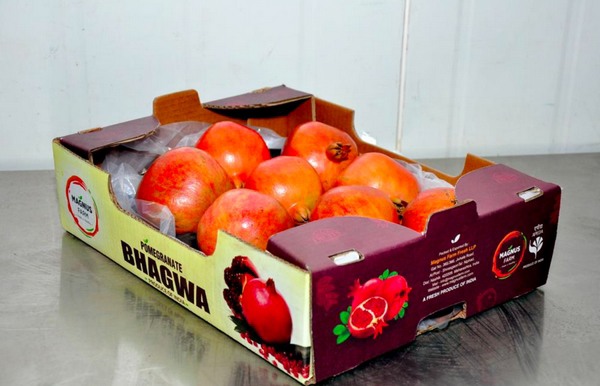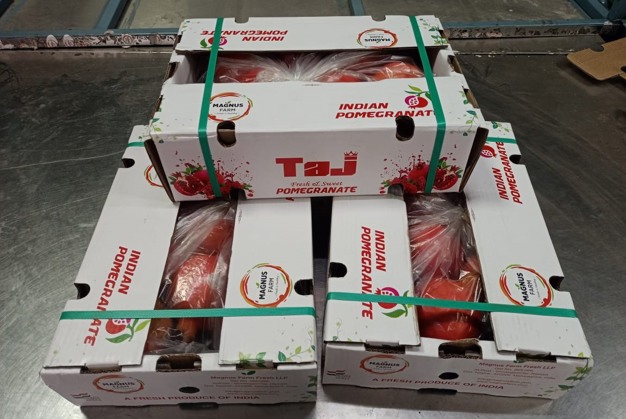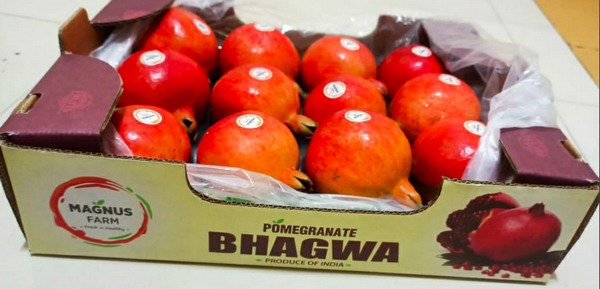The pomegranate season in India is going well, with higher demand this year, says Girish Sarda, founder of Indian fresh produce exporter Magnus Farm Fresh: “Indian pomegranates are stealing the spotlight this year. In comparison to last year, the Indian Bhagwa variety has seen an upsurge in demand from Gulf countries, Malaysia, and Indonesia. This surge in demand can be attributed to a combination of factors, including the delayed arrival of Peruvian and Egyptian pomegranates, which created a unique opportunity for Indian pomegranates to shine. This unexpected gap in the market allowed Indian pomegranates to step in and seize the moment. Our windows in March-April and July-August bagged higher orders from South East Asia, countries such as Malaysia, Singapore and Indonesia. Additionally, Europe and Thailand are also a bright spot and India will start loading from November onwards.”

Not everything is smooth sailing for this year’s season, Sarda explains. “Weather conditions and fruit sizes are two major challenges for meeting expectations of Asian clients. As summer peaks in India during May-June, high heat restricts the colour development of the skin and arils. Arils almost stay white to pinkish during peak Indian summer season, hence export shipments come to a halt. Indian pomegranates are smaller in size compared to Egyptian, Turkish, and Peruvian pomegranates, whereas Asian buyers have similar expectations from Indian exporters to supply larger sizes like 6/7/8.”
“To address these challenges, we try discussing supply windows of Indian pomegranates, considering seasonality of other geographies to make the most of business during peak demand. Secondly, on sizes, educating and making our target clients aware of what India can grow, accepting a mix of large and small sizes in a shipment are few ways to handle buyer expectations of larger sizes. We also try focusing on strengths of Indian pomegranates like high brix, which should be over 15, bright cherry red arils and soft seeds. Palatability of Indian pomegranates is what sets them apart.”

Sarda emphasizes it helps to find markets that accept the situation of the Indian pomegranates in terms of the sizes: “Malaysia, Singapore, and Thailand are promising markets for Indian pomegranates, as pricing and transit time are ambient. Volume wise, Malaysia is more promising considering this year’s trend. Quality and size wise, these markets accept smaller sizes like 12/14/16 as well and have good demand, hence becoming a prime destination for Indian pomegranates. Magnus Farms has achieved strong growth in pomegranates exports to Malaysia, Indonesia, and whole of the Middle East. We have also catered to supermarkets in Thailand and are open to new collaborations.”
Registering strong demand and with a vision to expand their presence in these markets, Magnus Farms has also launched their own pomegranate brands - Magnus Farms and Taj. “We’re heavily invested in bringing sustainably grown pomegranates to Asian markets by bringing certified, clean, and directly sourced pomegranates to our clients,” Sarda explains. “Another attractive market for Indian pomegranates is Thailand and Europe. Wholesale and retail chains in EU and Thailand fit well for our small size pomegranates and we have had exported sizes from 10/12/14/16 in previous seasons. Magnus team is all geared up to start loading fully certified pomegranates to these markets from mid-November 2023.”

Ever since logistical costs have come down again, the export of produce is more profitable once again, Sarda states. “Prices have remained stable since last year but there has been considerable drop in freight since the last year resulting in more feasible and lucrative CIF offers to Asian clients. We expect the prices to remain stable for the coming season unless there’s an unlikely weather even causing supply disruption.”
Returning to Hong Kong
Sarda states that he’s happy Asia Fruit Logistica has returned to its former location: “It’s great to be back in Hong Kong this year. We’ve had seen the scale and participation of HK and China clients in AFL Hongkong seasons pre-covid and we are excited to be experiencing that enthusiasm yet again. We have recorded success in our first full-fledged season of grapes to China and we are geared up to be expanding our presence in this segment. Thus, we are extremely happy and positive our AFL Hongkong chapter this year and we are sure that it will record an astounding success in terms of footfall, sessions, and interactions.”
“We will be focusing our grapes and pomegranate brands for China, SE Asia, and middle east. Magnus is elated and proud in becoming 4th largest grapes exporter from India and it we are set to expand our footprints. SE Asia and China are our promising markets due to shorter transit, lucrative prices, Indian seasonality, and suitable varieties. Our grape brands ‘Simmba’ in China for 8kg packing, and ‘Frution’ for Malaysia and Singapore in 5kg packing have gained popularity in 2023 season. Additionally, we have almost doubled our pomegranates export volume to these markets and we are confident about our quality, sourcing, production strengths, and strict adherence to certifications to build strong position in gulf and SE Asia.”
Magnus Farms will be exhibiting during Asia Fruit Logistica. You can find their booth in Hall 5, booth 5Q51.
For more information:
Girish Sarda
Magnus Farm Fresh
Tel/Whats App: +91 - 9167479099
Email: [email protected]
www.magnusfarm.com
